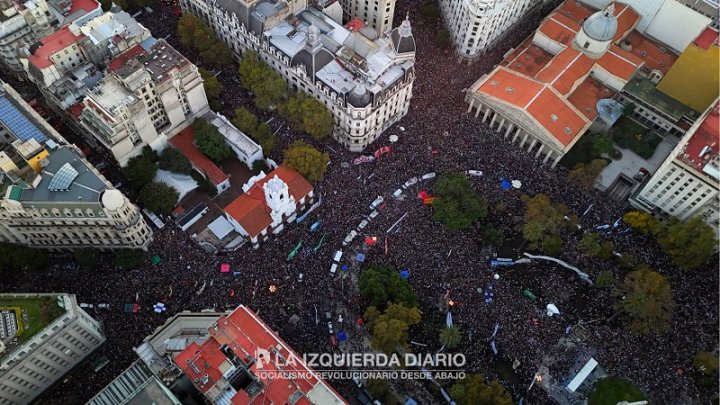
President Javier Milei announced that he will veto the University Financing Law sanctioned this Thursday, after using the same resource to veto the pension reform. This is a measure that aims to continue suffocating the public sector and attacking the basic rights of the population, with the argument that “there is no money”, while millions of dollars continue to be allocated to pay the illegal and illegitimate debt with the IMF.
After learning that Milei will veto the law, the national deputy of the PTS/Left Front, Nicholas del Cañosaid in X: “Now he announces the total veto of the University Financing Law. Let’s be millions in the streets across the country to overturn this veto on public education and defeat the entire plan of Milei and his accomplices.“.
Now he announces the total veto of the University Financing Law. Let us be millions in the streets of the entire country to overturn this veto of public education and defeat the entire plan of Milei and his accomplices. https://t.co/m2800xgSyM
— Nicolas del Caño (@NicolasdelCano) September 13, 2024
The law approved by the Senate represents a recomposition of an adjustment already made to the sector, which has already lost 30% so far this year, compared to the same period last year, according to data from the Congressional Budget Office. Without going any further, Progresar scholarships were adjusted by 65%. The project approved by Congress implies a “shielding” of the budget of public universities against future attempts at inflationary liquidation and its impact in budgetary terms is only 0.14% of GDP.
Its approval in Congress meant a new defeat for the Government and revealed the fragility of its plan to adjust the university budget and the salaries of teachers and non-teaching staff. The parliamentary session was framed by a significant mobilization outside Congress by university unions from all over the country, students and organizations that carried out a new day of strike, to demand its approval by the senators, after the Chamber of Deputies approved it.

Now, after the veto, according to article 83 of the national Constitution, must return to the Chamber where the debate beganin this case, the House of Representatives. If it is approved there by a two-thirds majority, the project is sent to the revising Chamber (in this case, the Senate).
In these votes, legislators must cast their votes by name, that is, they vote for or against. If both Chambers approve it with the required majority, the project is sent back to the Executive Branch for promulgation.However, if the chambers do not agree, the bill cannot be reconsidered during that legislative year. It should be noted that the President cannot exercise his veto power if Congress insists on a bill that has already been previously vetoed.
Therefore, it is essential that On the day the law is discussed in the Chamber of Deputies, let’s be thousands around Congress to make it clear that we will not allow the adjustments on universities and the educational community. As in the University March of 23A, we have to be millions to prevent the Executive Power from moving forward with the veto.
Milei said that she will veto the University Budget Law. She declared war on the entire student movement and the Argentine university community.
We will have to choose our allies: retirees, aeronautical workers, those who have been laid off.
— Luca Bonfante (@LucaBonfante98) September 13, 2024
We cannot trust the deputies of the employers’ forces, who after the veto of the pension reform, made it clear that they have no problem in erasing with their elbow what they wrote with their hand. Let us remember that the veto was possible thanks to the “87 heroes” who voted against (with the direct collaboration of the PRO, related blocks such as Zago’s, the 3 Tucuman ex-Union for the Fatherland and 5 deputies of the UCR) and the abstentions, such as those of Innovación Federal, and Lourdes Arrieta.
It is therefore essential to begin a major campaign now in all universities, schools, workplaces and neighbourhoods to demand that the trade unions call for a general strike and a plan of struggle to defeat this attack.
Source: www.laizquierdadiario.com

